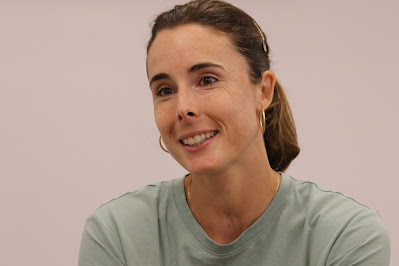 |
| photo by Daniel Ward |
I spent a little time with the Credit One Charleston Open's twelfth seed Alizé Cornet today, and we talked about tennis and writing and what those things have to do with how we live our lives. The veteran French player is the author of Sans Compromis, translated last year into English with the title, Transcendence: Diary of a Tennis Addict. I wondered what caused Cornet to write a memoir/diary, and she said that "I just thought it was time to put on paper some things that I had on my mind—to talk a little bit more about what’s happening behind the scenes….
"I always liked the exercise of writing, it was something very natural for me, and one morning, I just thought that I could write a book. And I started without knowing really where I was going, but I wrote it really fast. In about four months, it was done."
Cornet said that didn't know why she chose that particular time of her life to write the book; it's obvious, however, that she was in a state of flow while writing it.
"It’s more like a diary," she said, "because it was really putting on paper my thoughts, and putting a knee on the ground, showing people my vulnerability and my weaknesses, why maybe sometimes I was behaving this way on the court…and I’m just trying to explain why. …It’s very honest. Writing this book, my first goal was to be as honest as possible, and even though sometimes, it was a little bit ugly, that was okay, because we all have a dark side…."
 |
| photo by Daniel Ward |
I asked Cornet to name one or two things that she had learned from being a professional tennis player. She thought for a moment, then came up with two significant qualities--resilience and independence.
About resilience, she said: "This is something I’m also applying in my private life."
And in discussing independence, Cornet said that "It’s a very lonely world, and it teaches you how to be alone with yourself. And in the tennis life, you need to be alone, and to feel good alone. On the court, you’re also alone, making decisions."
Responding to a question about whether there is anything that she wishes she could change in her past, she quickly said, "I wouldn’t change anything because everything I did in the past makes me who I am." She elaborated that, of course, there are things that she (like all of us) could have done differently, but she made it clear that she is at peace with the person that she has become. "I’m very proud of my career, and very proud that I never gave up."
I wondered what Cornet would have done if she hadn't become a professional tennis player, and she smiled and said that it now seems pretty obvious--"maybe a writer." She plans to continue as an author once she retires from pro tennis, but she added: "I would like to be a Fed Cup captain, eventually, you know, just to stay in the tennis world and being able to help younger women and younger tennis players—that’s something that really drives me."
Next month, Cornet's first novel, La Valse Des Jours, will be published. Her first piece of fiction was inspired, she explained, by her mother's childhood. Set in the Sixties and Seventies, the story centers around a grandmother, aunt and mother--"their lives and what they've been through."
As of now, the plan is to publish the novel in French, but I'm sure that many of us in the English-speaking world hope that another translation will be in the works before too long.
2 comments:
Cornet is a good interview subject.
Any scuttlebutt on the ending of Vandeweghe/Gasanova?
Haven't heard anything, except for one vague comment about a line call.
Post a Comment